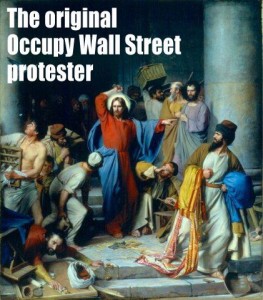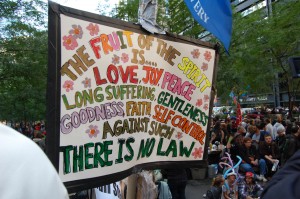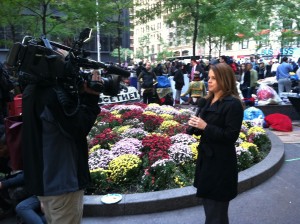Justice
Social justice index: USA No. 27 of 31. Democrats in Congress attempt to eat on $4.50 a day to protest potential budget cuts. Republicans shift focus from jobs to God. OpEd: Obama, the G20 and the 99 percent. In Congress, the rich get richer. The Shadow Superpower. And the U.S. sues South Carolina over immigration law.
What was most telling about the disagreement between the two men was their discussion of Luke 4. Mohler argued the passage should be understood in light of how he interpreted the preaching and teaching of Paul and the other apostles. This means that when Jesus said that he came to bring good news to the poor that good news was personal salvation.
Wallis argued that yes, personal salvation is one part of that good news, but that the other part is the Kingdom of God breaking into the world and transforming societal relationships as well. When the Gospel is proclaimed, it is good news for a poor person's entire being, community and world -- not just his or her soul.
First, it was encouraging to hear Mohler spend a lot of time emphasizing that working for justice is essential to fulfillment of the Great Commission. Throughout the night he repeated his concern that a lot of Churches are REALLY bad at making disciples who actually do the things Jesus told us to do. As the president of one of the largest seminaries in the world, it will be interesting to see if he is able to train a generation of pastors who will do things differently. My concern is that he is missing the connection between his theology and the failure of Christians to actually do justice.
If justice is only an implication, it can easily become optional and, especially in privileged churches, non-existent. In the New Testament, conversion happens in two movements: Repentance and following. Belief and obedience. Salvation and justice. Faith and discipleship.
Atonement-only theology and its churches are in most serious jeopardy of missing the vision of justice at the heart of the kingdom of God. The atonement-only gospel is simply too small, too narrow, too bifurcated, and ultimately too private.
On Nov. 5 folks all over the world will divest from Wall Street and its banks … in order to invest in a better world.
Ideologies alone are not enough. There came a point in the movement to abolish slavery where ideology required responsibility. As one abolitionist said, “The only way to be a good slave-owner is to refuse to be a slave-owner.” To truly be against slavery also meant that you didn’t drink sugar in your tea, because sugar was produced with slave labor.
So on November 5, my wife and I will be joining the “Move Your Money” celebration, moving our money from Bank of America to the non-profit credit union here in Philadelphia.
It is one small step away from the vicious cycle that continues to see money transfer from the increasingly poor to the increasingly rich.
It is trying to take to heart Jesus’ command to “Get the log out” of my own eye.
It is a move towards Gandhi’s call to “Be the change you want to see in the world.”
It’s one little step towards being less of a hypocrite tomorrow than I am today.
Last weekend, I had the privilege of spending some time at the End Genocide Action Summit, which brought people from all over the world to Washington, D.C., to learn about and fight against genocide, particularly the ongoing genocide being waged by Omar al-Bashir against the people of Darfur, Sudan.
Baby steppin': Economy grew 2.5 percent in the third quarter. Democrats first offer: $3 trillion for debt. Immigration is a faith issue. Harsh rhetoric to derail the GOP? The canon of St. Paul's Cathedral in London resigns over plans to evict Occupy London protesters. Elizabeth Warren and the #OccupyWallStreet election test.
Vatican Meets OWS: 'The Economy Needs Ethics'; Lack Of Jobs Leaves More Suburban, Middle Class Sliding Into Poverty; Rick Perry Challenges Opponents' Abortion Stances At Iowa Faith & Freedom Dinner; Rick Perry Talks Iraq And His 'Love Affair' With Guns; Ask Candidates For Office About Poverty; Bachmann Gives 'Faith Testimony' At An Iowa Church; Evangelical Voters Hold Sway In Iowa
The reason the word Evangelical has become so poisonous is because the answer to the above question comes from a conversion-based model of cultural engagement - political, theological and social. Too many Christians believe, and have wrongly been taught, that those "others" and "opposites" who have made an active choice not to believe in "our" teachings are justifiably: 1) left to their own devices as we wash our hands of them because of their bad choice (think in terms of blood-on-their-own-head); or 2) uninformed, so much so that their "no" is an illegitimate answer.
Evangelicals care more about positions -- whether progressive or conservative -- than people. We lack nuance. We have become either all Scripture or all Justice. I don't know where the balance was lost in terms of holding Scripture in high authority and, simultaneously, loving with reckless abandon?
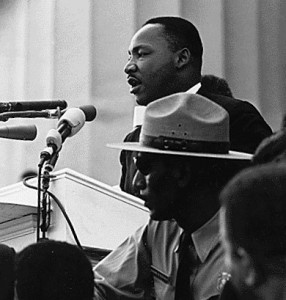 At the dedication ceremony for the Martin Luther King, Jr. Memorial, at least two speakers -- the Rev. Bernice King, Martin Luther King's daughter, and the Rev. Jesse Jackson, one of King's lieutenants -- reminded us that at the end of King's life he was planning the Poor People's March
At the dedication ceremony for the Martin Luther King, Jr. Memorial, at least two speakers -- the Rev. Bernice King, Martin Luther King's daughter, and the Rev. Jesse Jackson, one of King's lieutenants -- reminded us that at the end of King's life he was planning the Poor People's March
The Poor People's March is an ancestor to the current Occupy Wall Street movement that we see breaking out across the globe today. The idea was to bring poor people from across the color line -- white, black, brown, red, yellow -- to Washington to call attention to the importance of economic justice. King understood that economic justice -- distributive justice -- was not a matter of race in the United States.
It was true then, and it is true now that African Americans and Latino/as suffer disproportionately from income inequality. But it is important to remember that people of all colors suffer from the corrosive effects of income inequality. Some of the poorest communities in the country are European American. The poorest states in the United States with some of the worse educational and health care outcomes are states in the former confederacy.
Income inequality has increased since 1968. So the question that insists upon being answer is this: Why has income inequality worsened between 1968 and today?
My friend, Harry Jackson, said that my ideology isn't "Christian" but I suspect what he really means is that it isn't Republican and that's why he disagrees with the things I have said. It's important for Christians to understand those aren't the same thing. I think Bishop Jackson's economic ideology that is indistinguishable from Republican and Tea Party talking points, but I would rather have a civil discussion together as Christians about our differences; rather than his accusing Christians who don't share his conservative economic opinions as coming from "the councils of Hell." C'mon, Harry. I believe the Bible's teachings on wealth and poverty challenge both Republican and Democratic economic views which, sadly, are both often sold out to the interests of the wealthy and large corporations, when they should be focused on the ones Jesus calls "the least of these." Can we discuss that Harry?
After an hour or so of echoing statements of faith, prayers and petitions aloud and in unison, when the hundreds-strong crowd began to disperse, I caught up with one of the event's organizers -- the Rev. Michael Ellick of New York City's Judson Memorial Church.
Standing at the top of a flight of stone stairs at the west end of the park, looking down on the massive crowd as it moved through the rabbit warren of tarpaulins, lean-tos and the occasional portable sukkah (it is Sukkot, after all) below, I turned to the vaguely weary clergyman and asked, "So ... what now?"
Churches play the unique role of seeing the big picture. We can call out the values and virtues of the issues. Let's not just worry about the poor in our own communities, but the poor everywhere, the people everywhere who are struggling. We can't be private anymore. We must be living water for all people.
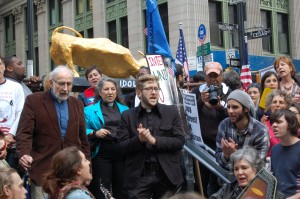 People everywhere are leaving their private spaces and gathering together -- that's already church. This is a Holy Spirit moment.
People everywhere are leaving their private spaces and gathering together -- that's already church. This is a Holy Spirit moment.
Last week, Sojourners CEO, the Rev. Jim Wallis, visited with #OccupyWallStreet demonstrators in New York City. "As I listen to them, I recognize what I felt as a young student-activist in the late '60s and early '70s," Wallis said. "I just feel from them what I felt a long time ago, that we're part of something much bigger than us, much larger than us...The visceral feeling [here] is, 'This could really change things.'"
I had seen people my age start successful businesses, become pop-stars and even play a key role in partisan political campaigns, but I had never seen them develop and sustain a social movement.
Sure there have been more focused shifts around issues like educational equity, LGBT rights or global poverty that my generation has had a hand in shaping, but nothing that quite had the look or the feel of what I imagined the anti-War or Civil Rights movements of the 1960s to have been. I assumed we -- my contemporaries ( I'm 27) -- simply didn't possess the interest or the will-power to accomplish something that big.
I was wrong.
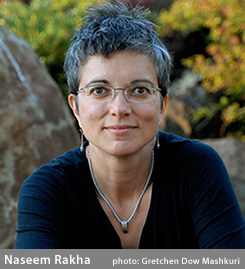
Naseem Rakha, author of the 2009 novel The Crying Tree sees justice differently. Rakha, an award-winning journalist whose work has been featured on National Public Radio and elsewhere, has covered two death penalty cases in Oregon -- the only two in that state's history -- and has spent considerable time exploring the deeper story behind capital punishment, retributive justice and forgiveness.
"What I learned from talking to these victims is that there is a place, not called closure, not called moving on, but there is a place of empowerment," Rakha said in a recent interview with God's Politics. "Crime strips people of power, and there's nothing that the justice system or really even churches can give to you to replace that power. It is an act of wanting to sit down and meet with the person who strips that power from you that has transformed people's lives and gotten them to a point where they can forgive the act, because they see the perpetrator no longer as a monster, but as a human that has made a terrible mistake."
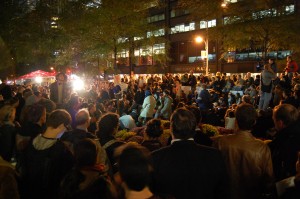 Throughout the day here at the #OccupyWallStreet mass demonstrations in New York's financial district, you can find small and often somber groups meeting.
Throughout the day here at the #OccupyWallStreet mass demonstrations in New York's financial district, you can find small and often somber groups meeting.
They have agendas, a facilitator, a time keeper, and someone to keep track of the "stack" -- the list of people waiting to make a point or ask a question.
And they also have a system of hand gestures -- a sort of gonzo sign-language adaptation of Roberts Rules of Order -- designed to keep the discussion and decision-making process both democratic and efficient.
When someone agrees with a point the speaker is making, the crowd raises two hands in agreement. When the crowd disagrees, hands quickly go up, making a downward pointing motion. To call a "point of process" crowd members shape their hands into a triangle to stop discussion. Speakers who wander off topic are quickly redirected and reminded of the point being discussed in the agenda.
These working groups bring their recommendations to the #OccupyWallStreet General Assembly, which takes place once a day. A vote is taken to determine consensus before a recommendation is passed along to the G.A.
Anyone participating in the General Assembly can block a proposal by forming an X with their arms. Participants make their case and then a revised proposal is put forth. The revised proposal can then be passed with a 90/10 consensus.
Produced by Cathleen Falsani for Sojourners/God's Politics
Photos by Heather Wilson and Carrie Adams/Sojourners
Music by Jason Harrod (used with express permission from the artist)
Song: "For Your Time" from Jason Harrod's album Bright As You, 2006
All Rights Reserved

